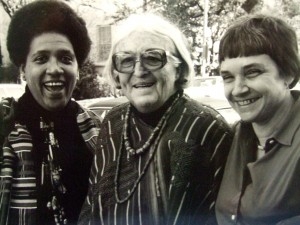
To Audre and Adrienne,
Prologue
Because a true vision holds much power, if it is not killed into this reality, it will have no place to go, and all its power will destroy the one who received it. A vision is a responsibility, and to kill the vision into reality is a complete act of power.
Dreaming the Council Ways, Okhy Simine Forest, p.92
I sit down to write to Audre and Adrienne a letter, and in this letter I mean to explain to them who I am, and what is my vision of womanhood and change. How do I insist that this notion of feminism is more ancient than the programs for economic empowerment, and how it goes beyond what we understand of violence in the modern world, that it extends to a memory I invoke by understanding my particular history, of this land and this culture, of knowing that I will continue to evolve as long as I unfold my ancestral roots, the forgotten history, where the feminine / female was sacred.
That this kind of feminism, if we wish to call it that, runs deeper in our blood than any other “identity,” that it allows me and many others to know that what they call an “act of rebellion” is nothing more than an instinctual pulse that we have followed. That regardless of what they say, and however they say it, what women have suffered from and continue to suffer from, is not normal. That patriarchy in its sectarian, national and capitalist faces will not fall down, until women, especially those in the south of the lands, change their consciousness and remember who they are and what they have always represented, that they meet, and create spaces free of that.
I wanted to write about the layers of identities, sexualities, class and privileges that prevent us from moving towards the ways of true change. How every time people use English my heart gets broken, as I feel our mother’s tongue is being cut over and over again, and we are forgetting what we are, and how to look at ourselves from that language in particular, and how we invent ourselves through it, distancing ourselves from what the colonialists told us. That I feel ashamed of having to write this in English, because many of my sisters choose the easy ways of communications, that the sum of what we know and we don’t know about is not being documented, that we often don’t practice what we preach.
That we are surrendering to the system, and it is luring us to a change that happens a certain way, into a revolution that fits the market, a revolution that doesn’t not challenge our brothers and sisters into an understanding of how working with feminists is not an issue of diversity; it is an issue of saying that your spaces, your attitudes and your actions are women “friendly,” that you don’t treat women in meetings as either princesses or as hysterical, as an object of love or as an object of liberation. That women’s spaces and their work is about shifting the paradigms of work and politics.
I have realized that I don’t have a vision, that the sum of my visions has been killing parts of myself. The parts where I’ve fought battles to cultivate. I realize that I’m so detached from the person I wanted to give birth to. We all give birth while we transform into the people we want to be, we mature in labor, while we struggle against conforming or holding onto our new-found beliefs.
We all understand that liberation and emancipation is an act of individuality, before it is an act of collectiveness. We all change, we all cultivate this change, adding to it and taking from it, so that we become what we are meant to become. To have visions is to have the desire to change, to have a desire means that the power to create hasn’t been taken away from you, and your chances of survival are stronger. We don’t live in the wilds to worry about survival, but we do live in a globalized economy, our identity crises are becoming more or less crises of consumers and consumerism. Can I afford this house? Could I afford this lifestyle?
To survive is to constantly make sure you can consume. I’ve consumed enough of the promoted individual lifestyle, I’ve consumed enough of love stories and emotions, I’ve consumed enough of activism. I’ve consumed enough of being an individual living in Beirut. I’ve consumed enough. I’ve consumed enough coffees at Younes’, and drinks in Hamra, I’ve consumed enough of polite greetings, I’ve consumed enough ways to tame my sexuality so it doesn’t freak people out, I’ve consumed enough betrayal from those who are confused about the difference between friendships and social networking. I’ve consumed enough of not being visible as the only Palestinian in a room, and that needs to count for something, I’ve consumed enough of being the token of diversity. I’ve consumed enough of promises of change. I’ve consumed enough of hatred because if we can’t deal with one another, then we’ve got to hate one another. I’ve consumed enough of avoiding connecting with anyone, because I’ve consumed enough experiences to learn that trust means honesty. I’ve consumed enough lies to understand that everything that we live amidst is a lie, that everyone consumed a little bit in it that it became our reality. I’ve consumed enough assimilation to fit in my Lebanese surrounding, that my need to return home had grown tremendously. I have an unmistakable urge of returning home. I want to get out of here, if “here” will not change.
Dear Adrienne and Audre,
I’m old as my wounds are, and they seem to be growing older but preserving their freshness. I’ve been meaning to write to you both, but now that Adrienne too has left and the letter I’ve been meaning to write you both became a metaphor, of having this urge to write to those who wish to listen; a metaphor of good will and wishful thinking, that words build bridges, and words destroy them too, that words are the gems of survival and salvation, they are manifestation of faith, they have the ability to shift what is stagnant into motion, they are the components needed to heal, of all potions, of all healing recipes, words are the catalyst of change. .
I live in Beirut, a city that is the living and breathing example of the world we live in today, a city that represents short memory, with an outstanding privatized downtown that screams in your face: nothing happened here. Nothing of importance at least. A city that hosts migrant workers and shove them off its balconies, a city that is welcoming and generous to the visitors from the west, that it caters to all their needs, and transforms itself into their homes, even at the expense of its local sons and daughters while they leave the city slowly to those who can afford living in it. Soon, Beirut will know no poverty, soon Beirut will hide them well in its peripheries, suburbs and towns, with houses and balconies overlooking Beirut, as it becomes an ultimatum for internationality .
I.
I’ve been meaning to write to you about an outline of a story concerning a group of friends, a group of friends that once had the ability to create change and sustain it. A group of friends that represented the core of what you both talked about, a group that understood queer, feminist and the baggage that each brings on the table. A group of friends each with a talent, each with a history of her own, each with a shadow of insecurities, and fears. A group of intellectual and artistic talents, of witches, seers, visionaries, healers and so much more, a group of friends, that understood that womanhood unfolds to become the secret of life itself. But I couldn’t. I was afraid if I had a vision of this group, and this vision doesn’t become true, it could kill me. Kill us.
II.
I had a few questions for you, but it’s too late now. I wanted to ask you about your communities, were they harmonious as they sounded? Did you not belittle each other’s work? Did you not betray one another? Did you exclude one another, until everyone excluded everyone? Did you become what these wounds made of you? Did you try to survive against all odds, but also against one another? Did you take in all the violence, all the discrimination, all the tactics of patriarchy and reflected it onto one another? Did you? Did you become a feminist version of your own societies– resources and power in the hands of the few? Did you hate one another, and did this hate drive you to silence each other? Blackmail one another? Did you fight, and did those fights preoccupy you from challenging what’s out there? Did you have to protect yourselves from your communities as much as you protect yourself from racism, sexism, and homophobia? Did you forget about what brought you together in the first place? Did you not learn how to forgive one other, and have faith in one another? Did you use your privileges against one another? Did you host parties and screenings in your own private houses so that you intentionally isolate one or two individuals? Did you use language against one another? Did you use academic achievements to delete the experiences learned by another through surviving what you theorize about, but never experienced? Did you compromise what is not yours so that you seek revenge against one another? Did you not read each other’s stories in a book that you all worked on and understand that you all came from such battles, and some of you are more bruised and more wounded than others? Did you mirror each other’s fears, and feared what you saw in that mirror? Did you make alliances with brotherhoods that neglect, belittle and use women’s presence in the struggle as it fits their apologetic politics, so you guarantee a space for yourself? I wonder if you did.
III.
I think about what I lose on a daily basis, if I’m not conscious and aware of how feminism is multidimensional, how it penetrates to the details of the details of my everyday life. How much do I lose, when I don’t understand that sisterhood is what saved me, from myself at times, and it’s what broke me at times. How much do I lose on a daily basis when I don’t make the effort to protect myself, by protecting others, by understanding that no (wo)man is an island, that anything without a sense of community to contain it and to engage with it, will not liberate me or my sisters.
Dear Audre and Adrienne, dark times are coming. I don’t know if you can see it from the other side, times where we need to make use of every single individual that believes in change, were we need to change something amongst ourselves, fear each other and one another less, for we complete each other.
I want to write more, but for now, I can’t write about any vision until I have the guarantees that this vision, will not kill me. Will not kill us.
Publisher:
Section:
Category:






